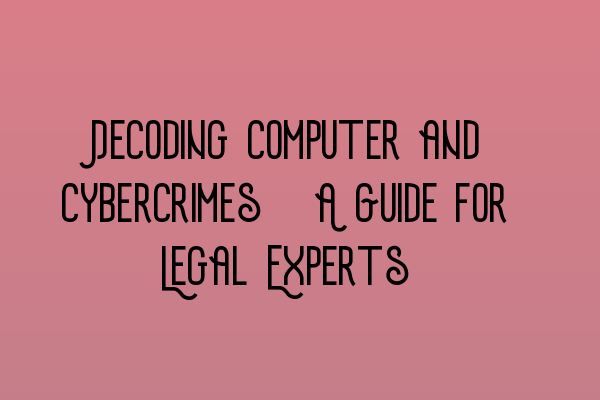Decoding Computer and Cybercrimes: A Guide for Legal Experts
Welcome to SQE Criminal Law & Practice Law UK. As solicitors and legal experts, it is crucial to stay informed about the ever-evolving world of computer and cybercrimes. In today’s digital age, the prevalence of these crimes is on the rise, requiring legal professionals to be well-versed in this specialized field.
Understanding Computer Crimes
Computer crimes encompass a wide range of illegal activities carried out using computer systems or the internet. These offenses can include hacking, identity theft, unauthorized access, spreading malware, and much more. As a legal expert, it is essential to have a deep understanding of the various types of computer crimes and the laws surrounding them.
SQE 1 Practice Mocks FLK1 FLK2
One of the key elements in dealing with computer crimes is being able to properly gather and analyze digital evidence. It involves understanding how to preserve and examine electronically stored information (ESI) from computers, servers, and other digital devices. In some cases, expert witnesses and forensic specialists may need to be consulted to ensure the integrity of the evidence.
Stay up-to-date with the emerging technologies and techniques used by cybercriminals. This includes knowledge of encryption, cryptocurrency, virtual private networks (VPNs), and the dark web. As the landscape of cybercrimes evolves, so should your expertise.
Consequences of Cybercrimes
The consequences of computer and cybercrimes can be severe, both for individuals and organizations. These offenses can result in financial losses, reputational damage, and even physical harm in some cases. As legal experts, understanding the potential impact of cybercrimes is crucial in providing effective representation.
In many jurisdictions, laws have been enacted specifically to address cybercrimes. Familiarize yourself with the applicable legislation in your jurisdiction and keep abreast of any updates or amendments that may occur. Stay informed about international laws and treaties related to cybercrimes, as these offenses often transcend national borders.
The Role of Legal Experts
As legal experts, your role in computer and cybercrime cases is multifaceted. You may be called upon to provide legal advice, conduct investigations, negotiate plea deals, or represent clients in court. Building a solid foundation of knowledge in this field will enable you to handle these cases with confidence and competence.
Furthermore, consider obtaining certifications or completing specialized training programs in computer and cybercrimes. These additional qualifications will not only enhance your expertise but also demonstrate your commitment to staying at the forefront of this rapidly evolving field.
Conclusion
As a legal expert, it is imperative to navigate the complexities of computer and cybercrimes with skill and knowledge. Understanding the various types of offenses, the legal framework, and the potential consequences is essential to effectively represent clients involved in these cases.
By continuously updating your knowledge, staying informed about emerging technologies, and expanding your skill set, you can ensure that you are well-equipped to handle the challenges of computer and cybercrime cases.
